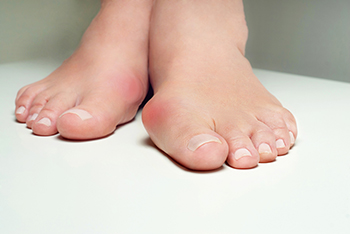 A bunion is described as a bony protrusion that forms on the side of the big toe. Many patients experience pain and discomfort from this ailment, and it may gradually worsen. It can happen as a result of genetic factors, or from wearing shoes that do not have adequate room for the toes to move freely in. The muscles can become weakened, and it is beneficial to perform specific foot stretches that may help to strengthen the affected area and overall foot. A foot scrunch helps to improve dexterity when performed regularly. This is done by placing a towel on the floor, and lifting it up with your foot. Toe yoga helps to improve mobility in the toes, which may positively affect general balance in the body. If you have developed a bunion, it is strongly suggested that you speak with a podiatrist who can offer you additional exercise and treatment options that are right for you.
A bunion is described as a bony protrusion that forms on the side of the big toe. Many patients experience pain and discomfort from this ailment, and it may gradually worsen. It can happen as a result of genetic factors, or from wearing shoes that do not have adequate room for the toes to move freely in. The muscles can become weakened, and it is beneficial to perform specific foot stretches that may help to strengthen the affected area and overall foot. A foot scrunch helps to improve dexterity when performed regularly. This is done by placing a towel on the floor, and lifting it up with your foot. Toe yoga helps to improve mobility in the toes, which may positively affect general balance in the body. If you have developed a bunion, it is strongly suggested that you speak with a podiatrist who can offer you additional exercise and treatment options that are right for you.
If you are suffering from bunion pain, contact Dr. Michael D. Garvin of Florida. Our doctor can provide the care you need to keep you pain-free and on your feet.
What Is a Bunion?
Bunions are painful bony bumps that usually develop on the inside of the foot at the joint of the big toe. As the deformity increases over time, it may become painful to walk and wear shoes. Women are more likely to exacerbate existing bunions since they often wear tight, narrow shoes that shift their toes together. Bunion pain can be relieved by wearing wider shoes with enough room for the toes.
Causes
- Genetics – some people inherit feet that are more prone to bunion development
- Inflammatory Conditions - rheumatoid arthritis and polio may cause bunion development
Symptoms
- Redness and inflammation
- Pain and tenderness
- Callus or corns on the bump
- Restricted motion in the big toe
In order to diagnose your bunion, your podiatrist may ask about your medical history, symptoms, and general health. Your doctor might also order an x-ray to take a closer look at your feet. Nonsurgical treatment options include orthotics, padding, icing, changes in footwear, and medication. If nonsurgical treatments don’t alleviate your bunion pain, surgery may be necessary.
If you have any questions, please feel free to contact our offices located in Port St. Lucie, FL . We offer the newest diagnostic and treatment technologies for all your foot care needs.
Read more about Bunions